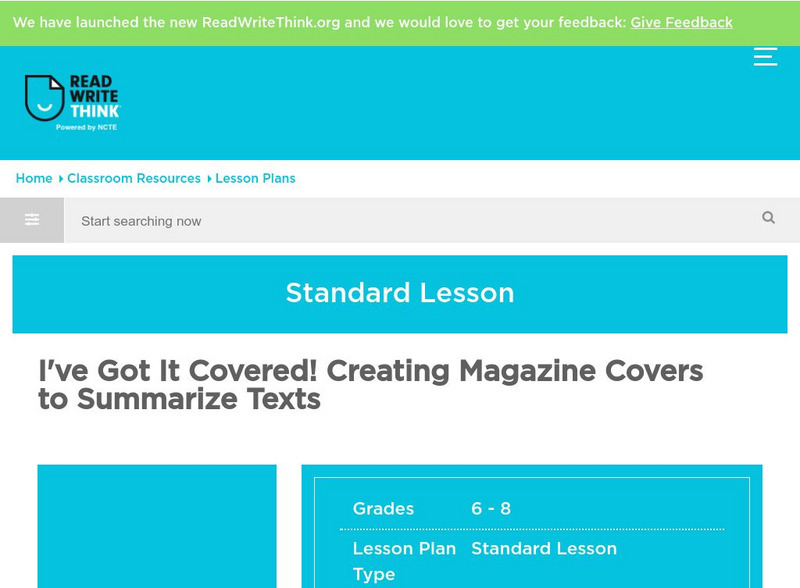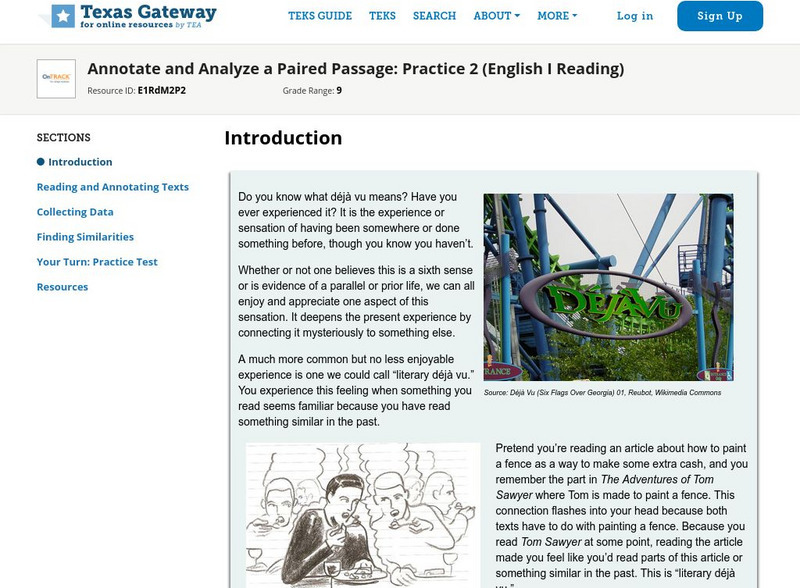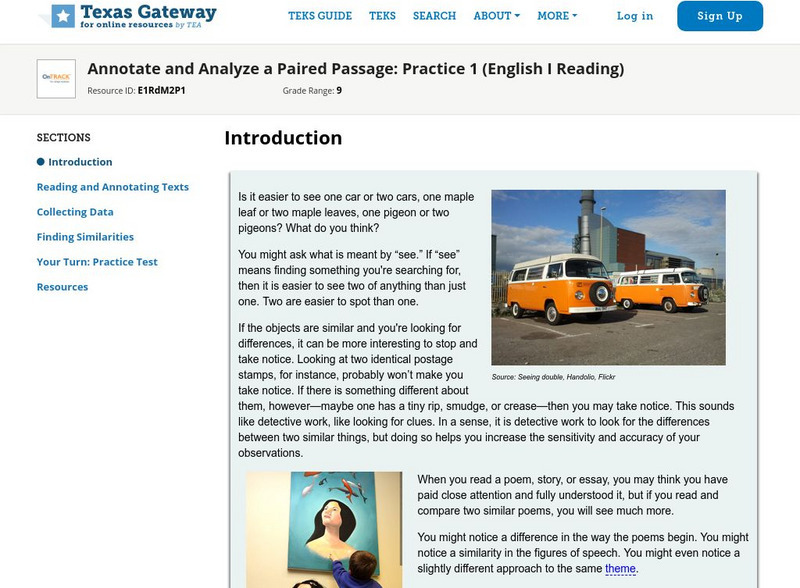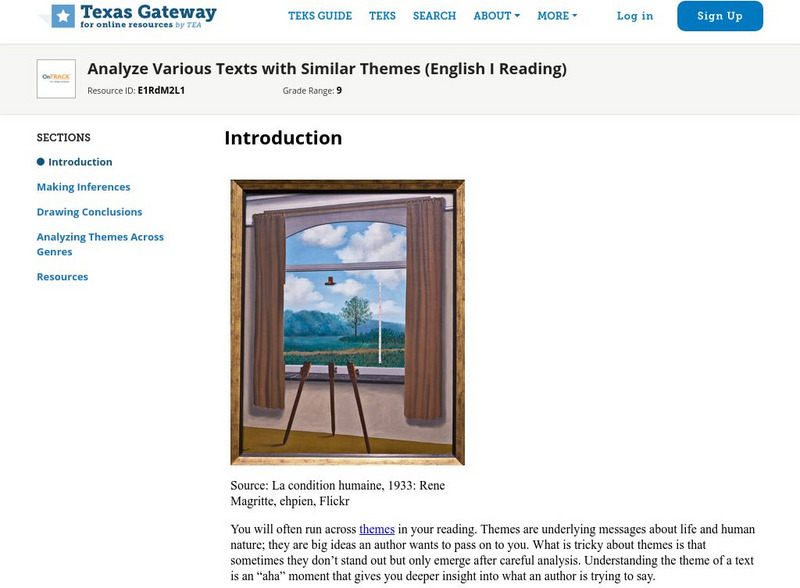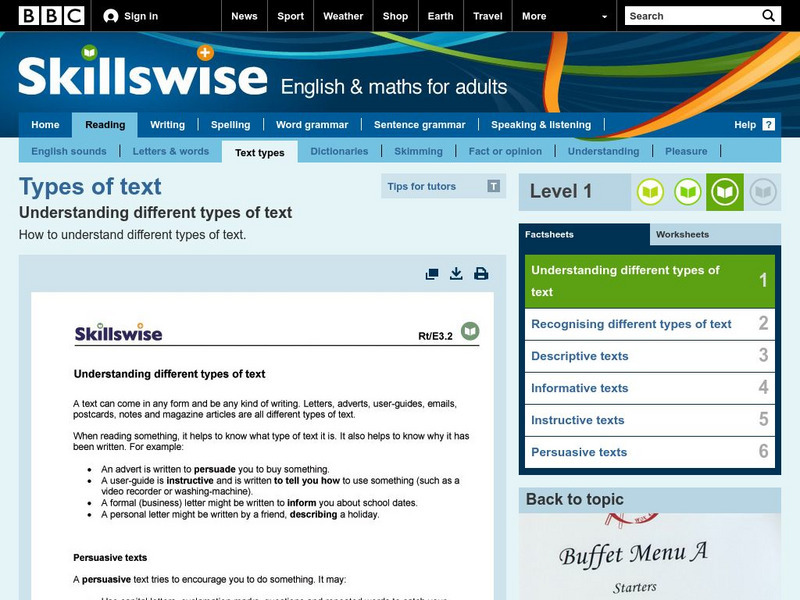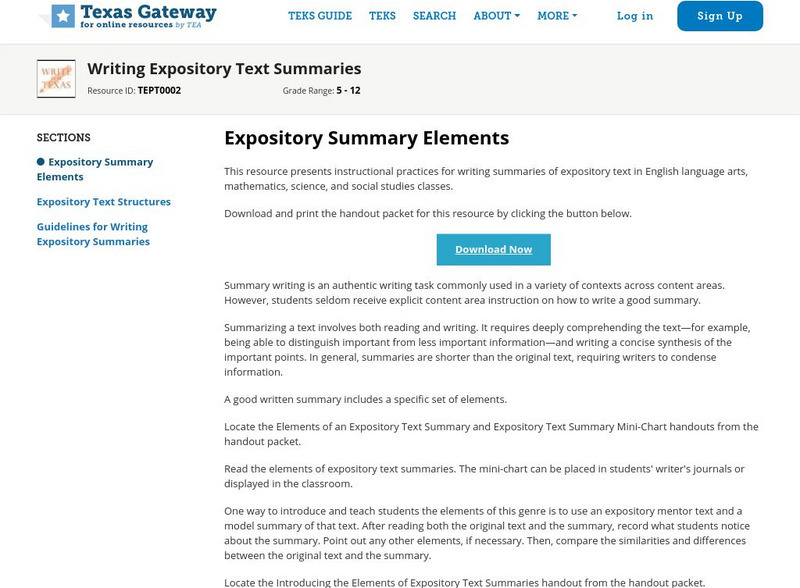Polk Brothers Foundation Center for Urban Education at DePaul University
De Paul University: Center for Urban Education: I Can Infer About a Story or an Event [Pdf]
Students will use this graphic organizer to help them make an inference about a story or an event. Students will list the literal text evidence and then make an inference about the text evidence.
Curated OER
Mc Graw Hill: Part 1 Reading: Literature: Summarize
Summarizing is a key skill needed in reading comprehension. This page describes how to summarize main ideas in a text. Click on Model button for a model with explanation and then click on Practice (Bottom Right)
Texas Education Agency
Texas Gateway: Analyze Texts With Similar/different Purposes
[Accessible by TX Educators. Free Registration/Login Required] Make complex inferences and use textual evidence such as imagery and figurative language to support understanding.
Texas Education Agency
Texas Gateway: Literary Nonfiction
Analyze literary nonfiction, particularly speeches, by making inferences and drawing conclusions based on evidence in the text.
Texas Education Agency
Texas Gateway: Compare/contrast Themes and Genres in Literary Texts
You will learn how to analyze, make inferences, and draw conclusions about theme and genre in different cultural, historical, and contemporary contexts and provide evidence from the text to support your understanding.
Texas Education Agency
Texas Gateway: Synthesize Ideas and Details in Several Texts (English I Reading)
Synthesize ideas and details in texts and support the connections with textual evidence.
Texas Education Agency
Texas Gateway: Annotate and Analyze a Paired Passage: Practice 2
Read and annotate paired texts in order to make inferences, draw conclusions, and synthesize ideas and details using textual evidence.
Texas Education Agency
Texas Gateway: Annotate and Analyze a Paired Passage: Practice 1
Read and annotate paired texts in order to make inferences, draw conclusions, and synthesize ideas and details using textual evidence.
Texas Education Agency
Texas Gateway: Make Inferences in Informational/expository Texts
[Accessible by TX Educators. Free Registration/Login Required] Use different organizational patterns as guides for summarizing and forming an overview of different kinds of expository text while distinguishing factual claims from...
Texas Education Agency
Texas Gateway: Compare Narrative and Informational Texts: Practice 1
Evaluate changes in audience, purpose, and tone in two different texts.
Scholastic
Scholastic: Informational Text: Reading Response: Cause and Effect [Pdf]
This graphic organizer can be used as a reading response when working with informational text. Students will write two different effects and record multiple causes for each effect.
Other
Learning Farm: Compare and Contrast Informational Texts
In this narrated tutorial, students are presented with information about first and third points of view, then read two passages about the same event and answer questions that compare how the topic is presented. After completing the...
Texas Education Agency
Texas Gateway: Teaching Expository & Persuasive Texts: Writing Expository Essays
In an expository essay, a type of informational text, the writer clarifies or explains something by using facts, details, and examples in a clear and concise way. To write an effective expository essay, students need a basic...
Learning Farm
Learning Farm: Common Core Standards: Text Structure in Literature
Practice comparing and contrasting the structure of two or more texts and analyze how the differing structure of each text contributes to its meaning and style. Choose test mode or game mode!
ReadWriteThink
Read Write Think: Creating Magazine Covers to Summarize Texts
In this lesson, students will examine the ways in which a magazine cover's headlines and graphics express the main ideas of its articles. They will then use an interactive tool to create covers that summarize chapters of informational...
Texas Education Agency
Texas Gateway: Make Inferences in Informational/expository Text
[Accessible by TX Educators. Free Registration/Login Required] In this lesson, you will be taking a look at how authors of informational texts, such as expository texts, organize their writing and the effects that organization can have...
Texas Education Agency
Texas Gateway: Analysis of Relative Values of Specific Data, Facts, and Ideas
[Accessible by TX Educators. Free Registration/Login Required] In this lesson we will talk about reviewing the facts and data you use to support your arguments and assessing the reliability of the sources you use.
Texas Education Agency
Texas Gateway: Annotate and Analyze a Paired Passage: Practice 2
[Accessible by TX Educators. Free Registration/Login Required] In this lesson, you will read and annotate a pair of texts to make inferences, draw conclusions, and synthesize ideas and details using textual evidence.
Texas Education Agency
Texas Gateway: Annotate and Analyze a Paired Passage: Practice 1
In this lesson, you will read and annotate a pair of texts to make inferences, draw conclusions, and synthesize ideas and details using textual evidence. You are going to look at two texts together to better understand them.
Texas Education Agency
Texas Gateway: Analyze Various Texts With Similar Themes
In this lesson, you will make inferences and draw conclusions about similar themes across various genres by finding supporting evidence within each of the texts. This task will require you to use your analytical reading skills, and it...
BBC
Bbc: Skillswise: Types of Texts Fact Sheets
Six printable fact sheets on how to understand and recognize different types of text including descriptive, informative, instructive, and persuasive.
Texas Education Agency
Texas Gateway: Writing Expository Text Summaries
This resource presents instructional practices for writing summaries of expository text in English language arts, mathematics, science, and social studies classes.
Louisiana Department of Education
Louisiana Doe: Louisiana Believes: Ela Guidebooks: Summarizing
This strategy helps students refine their understanding of texts to meet reading expectations and prepare for writing about texts.
AdLit
Ad lit.org: Multiple Texts: Multiple Opportunities for Teaching and Learning
Engaging all students in a themed study or unit is a challenge that teachers can resolve by using materials that match students' independent or instructional reading levels (Robb 1994, 2000). When students face textbooks that are above...


![De Paul University: Center for Urban Education: I Can Infer About a Story or an Event [Pdf] Graphic De Paul University: Center for Urban Education: I Can Infer About a Story or an Event [Pdf] Graphic](https://d15y2dacu3jp90.cloudfront.net/images/attachment_defaults/resource/large/FPO-knovation.png)
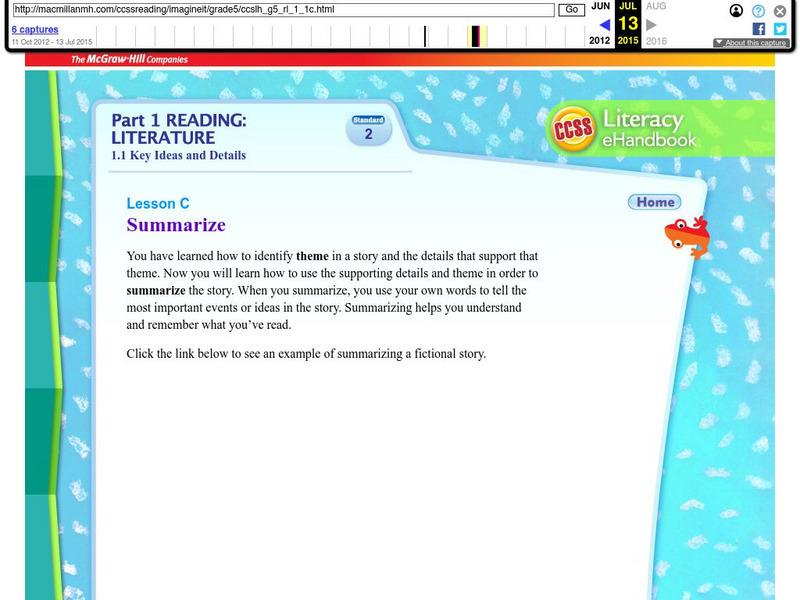


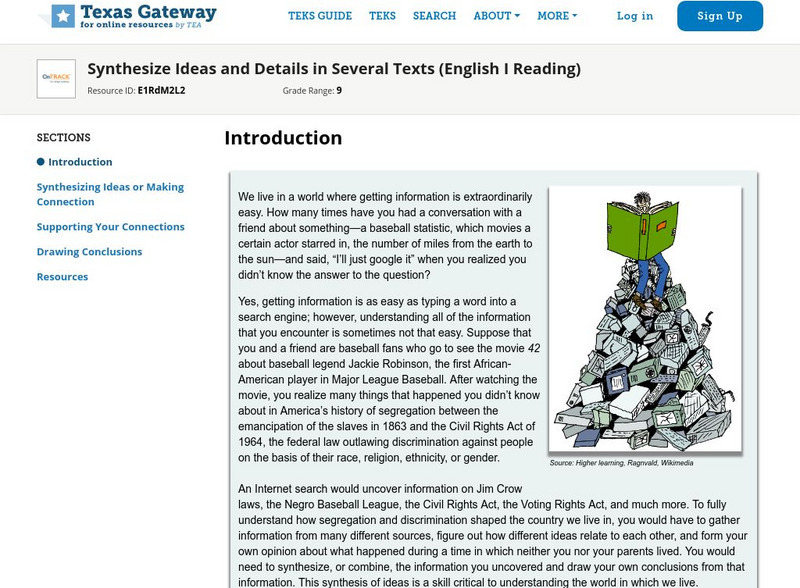

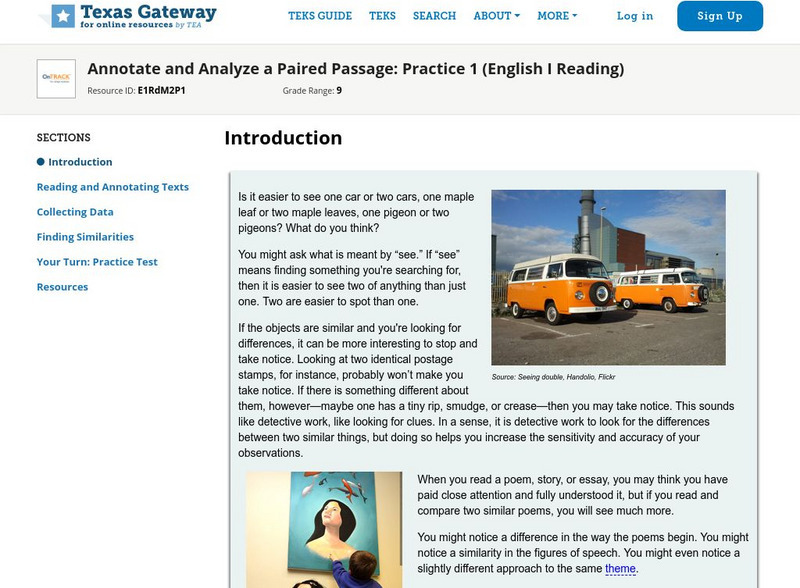
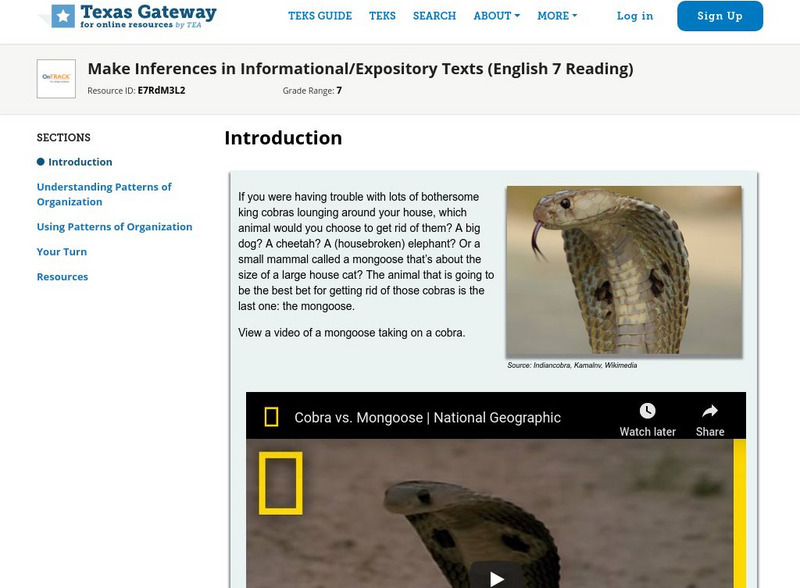

![Scholastic: Informational Text: Reading Response: Cause and Effect [Pdf] Graphic Scholastic: Informational Text: Reading Response: Cause and Effect [Pdf] Graphic](https://content.lessonplanet.com/knovation/original/362057-df6bdead3be3f2e4ac48ce2bbdb8424d.jpg?1661510819)



